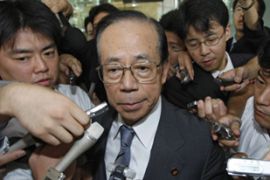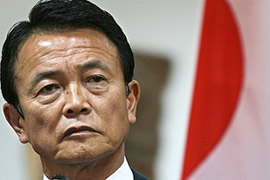Ex-minister is Japan PM frontrunner
Ruling party factions reportedly give support to man known for pro-Asian diplomacy.

Published On 14 Sep 2007
The party poll will be held on September 23 and the victor is assured of the premiership by virtue of the ruling camp’s grip on parliament’s lower house, which picks the prime minister.
Fukushiro Nukaga, the finance minister, was the first to declare that he would run, but on Friday decided to pull out and back Fukuda instead.
Battle heats up
That put the focus on a battle between Fukuda and Taro Aso, the LDP secretary-general and Abe’s foreign minister who shares many of the outgoing leader’s hawkish views on security policies.
 |
| Aso shares much of Abe’s conservative agenda to boost Japan’s global security profile [EPA] |
Analysts say the main difference between Aso and Fukuda would likely be in the area of foreign policy.
Aso, 66, who shares much of Abe’s conservative agenda to boost Japan’s global security profile and revive traditional values, had been seen as frontrunner to succeed him.
But his closeness to Abe and his record for gaffes have raised doubts about his suitability for the post.
Despite media reports that Fukuda was in the lead, however, some cautioned that the outcome was still uncertain.
Fukuda might be able to rally LDP factions, but some analysts questioned whether he could help the party avoid a bashing in the next election for parliament’s lower house.
No lower house poll need be held until 2009 but a deadlock in parliament could prompt one sooner.
| Abe quits | ||
|
Kunio Hatoyama, an LDP legislator told reporters: “Is it really OK to decide based on faction numbers?”
Fukuda played a pivotal role as chief government spokesman early in the reign of Abe’s predecessor, Junichiro Koizumi, expanding his brief into diplomacy and security and earning the nickname “shadow foreign minister”.
He resigned in 2004 after admitting he had skipped some payments into the public pension scheme, although some analysts attributed his abrupt departure to growing friction with Koizumi.
Source: News Agencies
